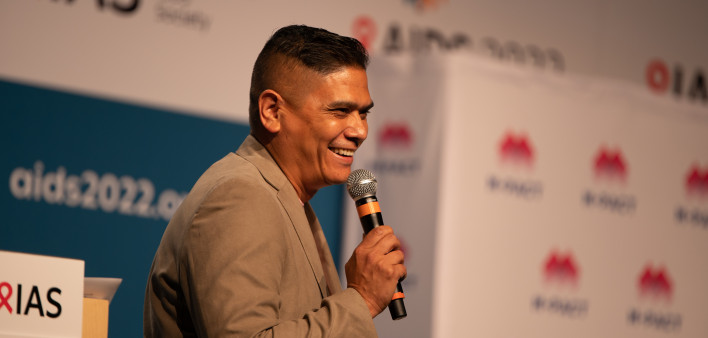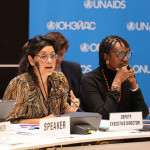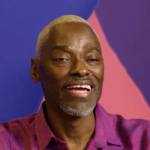According to Human Rights Watch, this year in the United States, state legislatures have introduced more than 520 anti-LGBTQ bills, 220 of which specifically target transgender and nonbinary people. What’s more, a record 74 of all those bills have been enacted, especially laws banning gender-affirming care for trans youth. It’s clear that a backlash to decades of LGBTQ progress is unfolding.
But despite this trend, the United States remains a haven for LGBTQ people relative to the entire world. According to Human Rights Watch, at least 67 countries—mostly in Africa, the Middle East and the Caribbean—criminalize same-sex relationships between consenting adults, and at least nine nations criminalize transgender and gender-nonconforming people.
This year, especially, LGBTQ rights advocates globally were outraged to see Uganda, which has made strides against HIV and AIDS in the past few years, pass one of the world’s most severe anti-LGBTQ laws—one that calls for the death penalty for “serial offenders.” Now, at least three other countries—Kenya, Ghana and Iraq—may pass similar laws. HIV and AIDS advocates have long said such laws work only against efforts to eliminate the epidemic in the countries that have passed them because they scare away folks in two groups most vulnerable to the virus—men who have sex with men and transgender women—from seeking prevention and treatment.
On the occasion of World AIDS Day, December 1, 2023, POZ talked with Andrew Spieldenner, PhD, a gay man living openly with HIV who heads MPact Global Action for Gay Men’s Health and Rights, which “advocates for equitable access to effective HIV prevention, care, treatment and support services for gay men and bisexual men, including those living with HIV, while promoting their health and human rights worldwide.”
Spieldenner discussed what is driving the new anti-LGBTQ laws, how the laws are impacting LGBTQ people on the ground and what advocates are doing globally to push back on such legislation.
In broad terms, how would you characterize what’s going on in multiple countries?
Right now, we’re seeing a rise in homophobia and transphobia across the world, but particularly in countries like Uganda, with its new law that includes the death penalty. This rise has had a devastating impact on our [LGBTQ] communities. It drives queer people out of the country and excludes us from lifesaving health care services. It’s due partly to social instability driven by economic instability, where scapegoating the LGBTQ community is easier than finding actual solutions to real problems. And these laws are coming at a time when groups like UNAIDS [the Joint United Nations Programme on HIV/AIDS] and PEPFAR [the U.S. President’s Emergency Plan for AIDS Relief] are talking about trying to end the HIV epidemic globally. With laws like these, that’ll be impossible, as more people go underground, lose their housing and jobs and are unable to access services.
What is driving the uptick in these laws or attempts to pass them?
A lot of them are driven and funded by American right-wing Christian evangelical groups. The Arizona-based group Family Watch played a large role in laying the groundwork for getting the Uganda law passed. As little as $1 million in support can get these bills passed. The people pushing them prey on the economic instability of these countries and get them to say about LGBTQ people or about women who want to have abortions, “This is the problem.”
Kenya and Uganda, for instance, owe China so much money. So much of the everyday discourse in Kenya is about the toll of these Chinese loans on the country and the corruption of the Kenyan government that caused these loans. Climates like this give rise to nationalist populist movements that blame everything on a minority group.
Are activists pushing back on these laws?
The World Bank, by halting new lending to Uganda in protest of its anti-LGBTQ law, has taken a more assertive stance than the United Nations or the U.S. government, and that’s a chilling realization. The big AIDS relief funders like PEPFAR and the Global Fund [to Fight AIDS, Tuberculosis and Malaria] haven’t threatened to pull back services because of the Uganda law because they don’t want those lifesaving services to stop. PEPFAR slowed their grantmaking process with Uganda over the law, but it still went through. The Global Fund wants to transition to funding services in Uganda directly to in-country providers, not via the government, but that’s difficult because in Uganda the line between the government and the private sector, or civil society groups, is very thin.
So there hasn’t been a lot of success reversing or preventing these laws?
There has been success in raising the alarm, but we’ve been stymied in trying to have more influence. William W. Popp, the new U.S. ambassador to Uganda, is trying to figure out how to support LGBTQ groups in the country as well as maintain diplomatic relations. But Uganda is among countries that have said that such anti-LGBTQ laws are a rebuke of having Western “colonialist” values imposed on them. And if someone calls you a colonizer, people shut down. But now more than ever, we need our allies to step up and not be chilled by this kind of name-calling.
In another move to pressure Uganda to get rid of its law, the United States just removed the country from its list of nations that can access the U.S. African Growth and Opportunity Act tariff-free trade program. The Biden administration said that Uganda, in passing its anti-LGBTQ law, had committed “gross violations” of internationally recognized human rights. The removal deprives Uganda of about $130 million worth of exports to the United States this year. It’s probably the strongest thing the Biden administration has done to Uganda on this issue so far. I sense that it puts other countries on notice that if they enact this or other kinds of human rights violations, they could lose trade privileges as well.
Is there any bright side to this story?
Yes. These handful of new bad laws are happening at the same time we’ve had an uptick in decriminalization of homosexuality in other countries—last year in St. Kitts and Nevis, Antigua and Barbuda, Singapore and Kuwait and, just this past October, in Mauritius, where the highest court rejected the criminalization as a remnant of colonialism.
That’s good. How has the Uganda law affected LGBTQ people there on the ground?
An organization called Strategic Response Team, which tracks hate crimes and discriminatory practices, has tracked more than 180 evictions in Uganda since the law went into effect as well as 18 cases of forced anal exams done by law enforcement. And we’ve seen no action from PEPFAR in terms of penalizing those clinics where the exams happened, even though the main PEPFAR office has said that they’re dealing with it.
We’ve also been in touch with Rainbow Railroad, a group that helps LGBTQ folks get out of dangerous countries, and with UNHCR [the United Nations High Commissioner for Refugees]. Increasingly, the United States and Canada are allowing LGBTQ people to be listed for migrant status. But the catch-22 is that if you’re living in a refugee camp, as soon as you document your LGBTQ status with UNHCR to help your case, everyone who works in the camp will see the file. Migrant centers in Uganda, Jordan and Guatemala are all facing problems being able to process LGBTQ applicants for this reason. A refugee organization in Los Angeles has had to put up money to house LGBTQ Ugandans elsewhere than in camps.
Then your fate is at the discretion of the U.S. immigration judge reviewing your case. To its credit, the Biden administration is trying to make it less of a burden for LGBTQ folks to prove their hardship and to create a pathway that doesn’t involve a judge.
What is the status of the anti-LGBTQ bills in Kenya, Ghana and elsewhere?
Kenya just introduced a copycat bill of Uganda’s law that activists are trying to kill. Ghana’s been trying to pass their bill for five years now. And while Iraq has been a hotbed of homophobic and transphobic violence, we are now seeing the introduction of a draconian law specific to LGBTQ persons.
How would you sum up the situation at this point as we head into 2024? And how can people help?
The LGBTQ community needs support from our allies to stand together against the increased homophobia and transphobia rising all over the world, including the United States and the United Kingdom. Some nonprofits directly support grassroots organizations in-country, such as my own MPact Global Action, GATE and Rainbow Railroad. For more information, keep an eye on Human Rights Watch and our social media, where we post regularly about events. We are facing a large battle, and we need each other to get through.







Comments
Comments